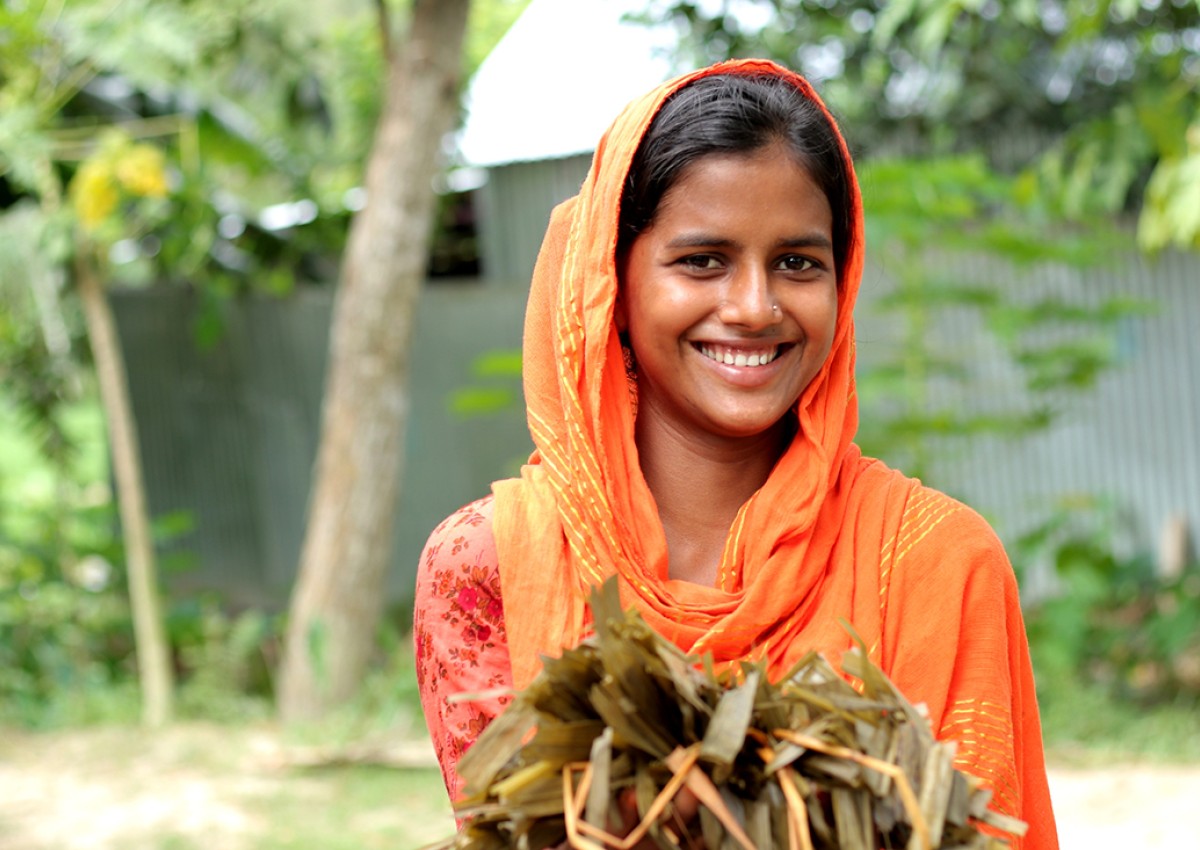





In a small village in Madarganj, Jamalpur, Bangladesh, 16-year-old Jerin lives with her family. Jerin heard from her mother how from generation to generation their family battled with monsoon flooding when the mighty Jamuna River expanded with upstream and seasonal heavy rainfall, submerging the villages on its shore. They hardly got any early warning of when the flood was coming or knew what to do beforehand. It was often too late for them to act as the flood water was already on the doorstep after swallowing their harvestable crop. Jerin also saw the discomfort of young girls after evacuating to shelter or highland as there were no proper sanitation facilities.
Jerin describes the impact on her community: “Climate change affects our area. Our houses get submerged due to excessive flood water. Tubewells, latrines are all submerged in water. It becomes very difficult to keep cows and goats. Cows and goats cannot be fed grass regularly, so the people of our area are giving up keeping cows and goats day by day. Due to excessive drought, crops are decreasing, crop pests are increasing, farmers' production is decreasing day by day.”
And the impact of climate change on Jerin herself: “I can't go to school because the roads are submerged during floods. When the house is submerged in water, I have to go to a higher place. As a girl, I cannot use a proper latrine there. When my father cultivates the crop during floods, the crop gets submerged. When he cultivates during drought, the crop yield is less due to lack of water. So the income of our family decreases.”
Jerin describes how the flooding impacts specifically on women and girls: “During floods, all people take shelter in high places. Women and girls cannot defecate or bath in open space. Many women cannot take a shower even after three or four days. Also, they cannot use sanitary pads for physical problems during puberty. And they don't feel safe in this open space.”
Jerin says climate change has made her fear for the future: “I fear for my future due to climate change. Sudden floods damage houses and crops, resulting in various diseases of cattle and goats. Now there is a new disease that causes inflammation in the skin of cows. Due to the lack of rain during the hot season, the crop does not grow properly. Due to this, the income from the crops has decreased, resulting in financial problems in our family.”
A will to make change brought Jerin to CARE’s SUFAL II project; she started her journey as community youth group member and learned about the need for early warning about flooding to take early actions. She shared with friends her knowledge on Forecast-based Action (FbA) and taught them where they can get early warnings from and exploring the Flood Forecast and Warning Centre (FFWC) website. They discussed the challenges they face during floods and brainstormed the solutions. It also supported her to actively participate in the Community Risk Assessment (CRA) of the union, where she, along with other community members, came up with a risk reduction and early action plan.
“Me and the young girls like me mostly struggle with safe latrine facility during flood; I tried to ensure that during the planning that this matter is prioritized”- said Jerin.
Jerin not only encouraged her friends, but also her family to understand the importance of taking early action. She brought her mother, Nargis, to SUFALs’ courtyard session; she got to know on a household level early action, proper methods of water purification, some hygiene practices and protection action to keep herself and the family secure. She also learned some homestead agricultural practices to meet household nutrition requirements during floods.
Jerin says: “After SUFAL II project came to our village I became a member of it and learned many things. I told many people who didn't know about how to get ready before the flood waters came. I learned about flood updates from the SUFAL II project Voice Call, shared them with people and try to help the elder people, like move grandmothers in high places, before the flood water came. If the government gives any grant, I tried to inform them and if no one gets it, I help how to get the grant.”
Jerin’s mother Nargis said, “We taught my daughter to do homestead gardening; and now we both know how to save the garden from flood.” She added that they had to struggle to get fresh water as the tube well got contaminated. Now she knows how to protect the tubewell and purify water which will save them from diseases.
Jerin agrees. “I thought about the damage done to my family and neighbours after the floodwaters came to their homes -- how to avoid them. I wasn't paying attention to these things before, but after becoming a member of the SUFAL II project, I learned a lot. For example, how to grow vegetables in a hanging way during flood, make silage for cows, proper hand washing process with soap. I have told everyone in the village about this and advised them to plant trees so that they can help with climate change.”
In this ongoing 2023 monsoon season, Jerin and her mother are actively taking early actions after receiving the forecast information and advisory from FFWC via the SUFAL project. While Jerin shared the information among her close friends, her mother informs the neighbours. Together the mother-daughter duo is empowering the community with information and inspiring them to take early action.
Monsoon floods have now increased in Bangladesh in both frequency and intensity over the past years due to rapid climate change, threatening community resilience, pushing more people into poverty, and putting a greater strain on humanitarian emergency response efforts. Moving from reactive response and recovery, Forecast-based Action (FbA) is an innovative approach implemented by SUFAL in the most flood-prone districts of north-west Bangladesh; Kurigram, Gaibandha, Jamalpur and Bogura that empowers community to act ahead to reduce disaster impact. European Union Civil Protection and Humanitarian Aid Operations (ECHO)-funded SUFAL consortium led by CARE with Concern Worldwide, and RIMES.
Jerin has a simple message for world leaders: "Due to climate change, there are frequent floods in our country. Houses, crops get drowned, cows and goats get damaged, it causes us a lot of loss. So, I want to tell the world leaders -- come forward on climate change.”
© Copyright 2026 CARE Bangladesh. Powered By Bangladesh Online